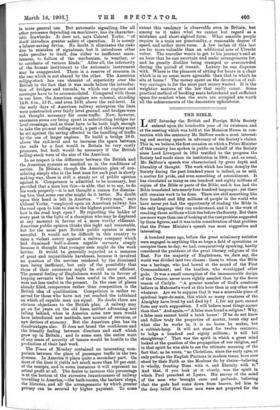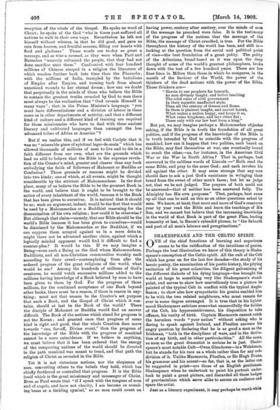THE BIBLE.
LAST Saturday the British and Foreign Bible Society entered upon the hundredth year of its existence, and at the meeting which was held at the Mansion House in con- nection with the centenary Mr. Balfour made a most interest- ing and moving speech in advocacy of the Society's claims. This is, we believe, the first occasion on which a Prime Minister of this country has spoken in public on behalf of the Society since Lord Liverpool in 1815 testified to the progress the Society had made since its institution in 1804; and, as usual, Mr. Balfour's speech was characterised by great depth and liberality of thought. The work which has been donel by the Society during the past hundred years is indeed, as be said, a matter for pride, and even something of astonishment. It has circulated as many as one hundred and eighty millions of copies of the Bible or parts of the Bible, and it has had the Bible translated into nearly four hundred languages; yet there still remains work to be done. There are still something like four hundred and fifty millions of people in the world who have never yet had the opportunity of reading the Bible in the only language they can understand, and it is the work of reaching those millions which lies before the Society. But there are more ways than one of looking at the vast problem suggested by those figures, and it was in his consideration of that problem that the Prime Minister's speech was most suggestive and
interesting. •
A hundred years ago, before the great missionary societies were engaged in anything like so huge a field of operations as occupies them to-day, we had, comparatively speaking, hardly considered the problems of the great literary religions of the East. For the majority of Englishmen, we dare say, the world was divided inte two classes : those to whom the Bible was a heritage, who had bowed at the sound of the First Commandment; and the heathen, who worshipped other gods. It was a small conception of the immeasurable design of the Creator, never more rightly assailed than by the fierce reason of Carlyle. "A greater number of God's creatures believe in Mahomet's word at this hour than in any other word whatever. Are we to suppose that it was a miserable piece of spiritual leger-de-main, this which so many creatures of the Almighty have lived by and died by ? I, for my part, cannot form any such supposition. I will believe most things sooner than that" And again,—" A false man found a religion ? Why, a false man cannot build a brick house! If he do not know and follow truly the properties of mortar, burnt clay and what else he works in, it is no house he makes, but a rubbish-heap. It will not stand for twelve centuries, to lodge a hundred and eighty millions ; it will fall straightway." That was the spirit in which a great mind looked at the question of the propagation of our religion, and in that spirit he was able to see the ultimate meaning of the fact that, as he wrote, "no Christians, since the early ages, or only perhaps the English Puritans in modern times, have ever stood by their Faith as the Moslems do by theirs—believing it s wholly, fronting Time with it, and Eternity with it." And that, if you look at it closely, was the spirit in which Paul preached at Lystra. His survey of the mind of the men who brought oxen and garlands, believing that the gods had come down from heaven, led him to the deep belief that those men were not prepared for the
reception of the whole of the Gospel. He spoke no word of Christ ; he spoke of the God "who in times past suffered all nations to walk in their own ways. Nevertheless he left not himself without witness, in that he did good, and gave us rain from heaven, and fruitful seasons, filling our hearts with food and gladness." Those words are to-day as great a message, and as wise a counsel, as they were when Paul and Barnabas "scarcely refrained the people, that they had not done sacrifice unto them." Confronted with four hundred millions of Chinese steeped in a religion the literature of which reaches further back into time than the Pharaohs ; with the millions of India, trampled by the battalions of Empire after Empire, and turning hack from almost unnoticed wounds to her eternal dream ; how can we doubt that perpetually in the minds of those who believe the Bible to contain the greatest truths revealed by God to man there must always be the realisation that "God reveals Himself in many ways " ; that, in the Prime Minister's language, "you must have differentiations and a division of labour in these cases as in other departments of activity, and that a different kind of culture and a different kind of training are required for those missionaries who have to deal with these ancient literaiy and cultivated languages than amongst the less advanced tribes of Africa or America " ?
But if we realise this, and if we feel with Carlyle that it was no "miserable piece of spiritual leger-de-main" which has allowed thousands of millions of men to live and to die in a faith different from our own, what are the grounds which lead us still to believe that the Bible is the supreme revela- tion of the Creator's mind, greater and clearer than any book embodying the faith of followers of Mahomet or Buddha or Confucius ? Those grounds or reasons might be divided into two kinds ; one of which, at all events, might be thought considerable by the strictest of Mahommedans. In the first place, many of us believe the Bible to be the greatest Book in the world, and believe that it ought to be brought to the notice of every inhabitant of the world, because it is the Book that has been given to ourselves. It is natural that it should be so; such an argument, indeed, would be the first that would be used by a Mahommedan or a Buddhist reasoning for the dissemination of his own religion ; how could it be otherwise ? But although that claim—namely, that our Bible should be the world's Bible because it has been given to ourselves—would be dismissed by the Mahommedan or the Buddhist, if we can suppose them arrayed against us in a mere deba te, might there not be advanced another claim, against which a logically minded opponent would find it difficult to find a counter-plea ? It would be this. If we may imagine a Being—even such a Being as the God whom Mahommedans, Buddhists, and all non-Christian communities worship each according to their creed—contemplating from afar the ordered progress of the great religions of the world, what would he see ? Among the hundreds of millions of God's creatures, he would watch successive millions added to the millions having knowledge of a Book believed by men to have been given to them by God. For the progress of those millions, for the continued acceptance of one Book beyond other books, there must be a reason, if there is reason in any- thing; must not that reason be the Creator's set purpose that such a Book, and the Gospel of Christ which it con- tains, should at last be the Book of the world ? There the disciple of Mahomet or Buddha would find an answer difficult. The Book of the nations which stand for progress is not the Koran ; and granted once that progress of some kind is right and good, that the whole Creation does move towards "one, far-off, Divine event," then the progress of the knowledge of the Bible with the progress of mankind cannot be a mere coincidence. If we believe in anything, we must believe that it has been ordered that the energy of the conquering nations of the world should be directed in the path mankind was meant to tread, and that path the religion of Christ as revealed in the Bible.
Yet it is not victorious nations, nor the eloquence of men, converting others to the beliefs they hold, which has chiefly furthered or controlled that progress. It is the Bible itself which is the great missionary and messenger of Christ. Even as Paul wrote that "if I speak with the tongues of men and of angels, and have not charity, I am become as sound- ing brass or a tinkling cymbal," so no man could count on having power, century after century, over the minds of men if the message he preached were false. It is the testimony of the progress of the nations that the message of the Bible, the message of Christ crucified, is true. For the Bible throughout the history of the world has been, and still is—.
looking at the question from the social and political point of view—the best foundation of a great polity. The polity of the Athenians, broad-based as it was upon the deep thought of some of the world's greatest philosophers, broke down with the test of a few hundred years. There are few finer lines in Milton than those in which he compares, in the mouth of the Saviour of the World, the power of the thinkers of the dead nations with the power of the Bible.
Those thinkers are-
" Herein to our prophets far beneath, As men divinely taught, and better teaching The solid rules of civil government In their majestic unaffected style,
Than all the oratory of Greece and Rome. In them is plainest taught, and easiest learnt, What makes a nation happy, and keeps it so, What ruins kingdoms, and lays cities flat ; These only with our law best form a king."
But yet, we may imagine perhaps a Mahommedan objector asking, if the Bible is in truth the foundation of all great polities, and if the progress of the knowledge of the Bible is in truth intended by God to coincide with the progress of mankind, how can it happen that two polities, each based on the Bible, may find themselves at war, one eventually bound to crush the other,—as, for instance, in the American Civil War or the Was in South Africa ? That is, perhaps, best answered in the sublime words of Lincoln :—" Both read the same Bible, and pray to the same God ; and each invokes his aid against the other. It may seem strange that any men should dare to ask a just God's assistance in wringing their bread from the sweat of other men's faces; but let us judge not, that we be not judged. The prayers of both could not be answered—that of neither has been answered fully. The Almighty has His own purposes." That, perhaps, best sums up all that can be said on this as on other questions asked by men. We know, at least, that more and more of God's creatures year by year read the Bible and learn the teachings of His
Son, and we cannot but believe that the increasing knowledge in the world of that Book is part of the great Plan, leading humanity at last, in Bacon's splendid phrase, to "the Sabaoth and port of all men's labours and peregrinations."











































 Previous page
Previous page